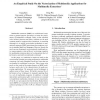Free Online Productivity Tools
i2Speak
i2Symbol
i2OCR
iTex2Img
iWeb2Print
iWeb2Shot
i2Type
iPdf2Split
iPdf2Merge
i2Bopomofo
i2Arabic
i2Style
i2Image
i2PDF
iLatex2Rtf
Sci2ools
123
click to vote
IPPS
2005
IEEE
2005
IEEE
An Empirical Study On the Vectorization of Multimedia Applications for Multimedia Extensions
Multimedia extensions (MME) are architectural extensions to general-purpose processors to boost the performance of multimedia workloads. Today, in-line assembly code, intrinsic functions and library routines are the most common means to program these extensions. A promising alternative is to exploit vectorization technology to automatically generate MME instructions from programs written in standard high-level languages. However, despite the early success of automatic vectorization for traditional vector supercomputers, state-of-the-art vectorizing compilers for multimedia extensions have yet to demonstrate their effectiveness, especially on multimedia workloads. In this paper, we conducted an empirical study on the vectorization of media processing programs for multimedia extensions. Our study identified several new issues that are not handled by traditional vectorizers. These issues arise partly as the result of the unique features of MME architectures, partly due to the characteri...
Architectural Extensions | Distributed And Parallel Computing | IPPS 2005 | Multimedia Extensions | Multimedia Workloads |
Related Content
| Added | 25 Jun 2010 |
| Updated | 25 Jun 2010 |
| Type | Conference |
| Year | 2005 |
| Where | IPPS |
| Authors | Gang Ren, Peng Wu, David A. Padua |
Comments (0)

